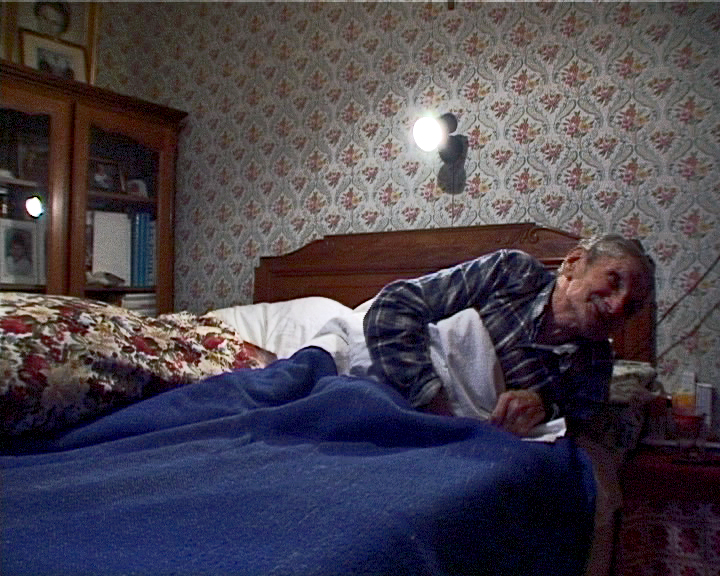 « Dans le lieu clos d’une chambre, un homme âgé, couché dans un lit, m’attend depuis trente ans. Il détient un secret et brûle de le divulguer. Je pose ma caméra DV au pied du lit. Le cadre de mon image transforme la chambre en scène de théâtre. Il ne s’agit pas d’une interview, plutôt d’un long monologue polyphonique filmé en plan fixe. Entre deux langues, le français et l’occitan, Jean Dougnac me raconte l’histoire singulière de mes parents dont j’ai été séparée à la naissance. Il me parle de ma mère Edmonde, du mystère de son handicap qu’il n’a jamais su résoudre. Il me révèle le secret de ma naissance. Les images sont dans sa voix. Rien n’est linéaire dans son récit : l’exposition d’une tragédie familiale plane, père et mère désavantagés, la misère, l’abandon, le tribunal des assistantes sociales. Mais c’est un fond sur lequel viennent se détacher d’autres histoires cinématographiques et politiques, d’autres vies en mouvement explorées avec les mots. La fin de sa narration est un suspense, un happy end, une fin ouverte à la fable, et un personnage en chemin. » "In the confined space of a bedroom, an old man lying on his bed has been waiting for me for thirty years. He has a secret and is dying to reveal it. I set my DV camera at the foot of the bed. The frame turns the room into a theatre stage. It is not an interview, but a polyphonic monologue in one long static shot. Juggling with two tongues, French and Occitan, Jean Dougnac tells me the singular story of my parents, from whom I was separated at birth. He tells me about my mother, Edmonde, whose mysterious handicap he was never able to identify. He reveals to me the secret of my birth. Images are conveyed by his voice. There is nothing linear in his tale: a family tragedy is about to be exposed, involving destitute father and mother, misery, abandonment, and family court. But it is only the background to other cinematographic and political stories, other lives in motion, explored through words. At the end of his tale, there is some suspense, a happy end, an ending open to fable, with the discovery of a character on the way.” Réalisation et image: Noëlle Pujol Montage: Claire Atherton Mixage son: Mikaël Barre Etalonnage: Eric Salleron Production: Noëlle Pujol Entretien avec Olivier Pierre, Journal du FID Marseille 10/07/2010 Texte de Loïc Diaz Ronda, projection Xcèntric, Barcelone. Prix: Prix du Groupement National des Cinémas de Recherche (GNCR), FID Marseille 2010 Festivals et Projections : "Autobiographies", Espace Culturel Louis Vuitton, Paris, 2012 (Exposition) Centre Culturel Français Georges Mélies, Carte blanche au FID Marseille, Burkina Faso, Afrique de l’Ouest, 2011 Filmscreening, Galerie Stedefreud, une proposition de Raphaël Grisey, Berlin, Allemagne, 2011 International Independant Film Festival, Indielisboa, Lisbonne, Portugal, 2011 Festival, « Miroirs du cinéma des films et des arts », Cinéma le Clap, Bollène, France, 2011 Xcèntric, le cinéma du CCCB, Barcelone, Espagne, 2011 Rencontres sur les Docks, Cinéma l’Atalante, Bayonne, France, 2011 Le P’tit Ciné, Cinematek, Bruxelles, Belgique, 2011 Punto de Vista, Festival International de Cinéma Documentaire de Navarre, Pampelune, Espagne, 2011 Cinésag, Cinémathèque de Grenoble, Grenoble, France, 2011 Rencontres Cinématographiques de Cerbère, France, 2010 15èmes Rencontres du cinéma documentaire, Cinéma le Mélies, Montreuil, 2010 Festival International du film de la Roche sur Yon, carte blanche au FID Marseille, 2010 FID Marseille, (Compétition nationale), Prix du GNCR, 2010 La Vie, à l’épreuve, Institut d'Art Contemporain, Villeurbanne, 2010 (exposition) |